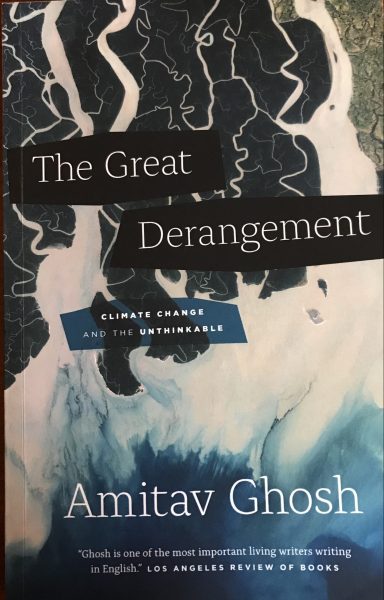With the future state of the planet in question, Amitav Ghosh explores the roles of literature and history in terms of their place in the climate crisis in his book The Great Derangement. Ghosh, a fiction writer who has experienced climate catastrophes in South Asia, structures his argument in three parts: Stories, History, and Politics. Through the course of the three sections one thing is clear: we are all taking part in the Great Derangement because of societal conditioning and cultural ideology. Ghosh focuses on the conceptual question of how writing fails to connect with the nonhuman world and portends that the reason the human race is complicit in climate change is largely due in part to imperialism. He invokes a plethora of ill-fated evidence as to why the fate of the planet has been doomed thus far, but in the end, offers an oddly optimistic prediction of the future.
By splitting the book up into three distinct sections, Ghosh covers a wide array of topics that all tie back to the fascination Westerners have with themselves and their progress. Ghosh begins with the section titled “Stories” in which he investigates the role of climate change in fiction. All too often works of fiction follow the so-called ‘moral adventure,’ something which John Updike heartily advocates, where the work focuses on a character as they traverse through the world, but the work does not engage with wider nonhuman elements of the story’s world. This idea is fostered by the expectations of contemporary culture and the “regularity of bourgeois life” that has become the norm in individualistic Western cultures. Readers are conditioned to expect a book to follow a character through a pivotal point in their life and see a significant change in their character by the end of the book. In short, books fail to engage the nonhuman world. The majority of fiction about climate change get lopped into the science fiction category, as if climate change is made up, intangible, and not relevant to the present day.
Perhaps the reason Ghosh is stuck on the idea that writers consistently write about individual adventures is because of the way in which society is structured. Western countries are unabashedly individualistic societies, and dare I say, selfish at heart. Everyone is concerned about their own advancement in life and how political policies impact them directly. Rather than considering the common good of communal or ecological worlds, it becomes difficult to think beyond one’s own narrow journey. Yet, individual efforts are not what will help save the planet. Collective action is what will prompt the biggest changes.
Ghosh argues that the West’s individualistic ideology stems from the ethnocentrism that arose during colonialism. The resounding empire and imperialism drive climate change. While Ghosh’s point has merit, and blaming colonialism has its place, the persistent selfishness of the West is what feeds capitalism today. The fascination with the idea of progress that is embedded in capitalism, something which Richard Powers grapples with in his book The Overstory, leads humans to actively destroy their environment solely for economic gain. As a result, capitalism is the hand that feeds environmental injustice in Asian and African countries and places them at a major disadvantage as the Earth continues to warm. While we cannot change the way imperialism played out, we can reshape how capitalism functions.
Yet, after so much blaming and finger-pointing, Ghosh offers a rather optimistic ending. He expresses a hope that a future generation will “be able to transcend the isolation in which humanity was entrapped in the time of its derangement…rediscover their kinship with other beings…[to] find expression in a transformed and renewed art and literature” (Gosh 2017, 162). But will a new generation step up, or will they fall to the same practices as previous generations? After all, history tends to repeat itself.
The Great Derangement
By Amitav Ghosh
University of Chicago Press
Lauren Frick is an undergraduate student at Indiana University Northwest pursuing a BA in both English and Spanish. She is also a Review Editor of Poetry and the Website Coordinator for Great Lakes Review.


